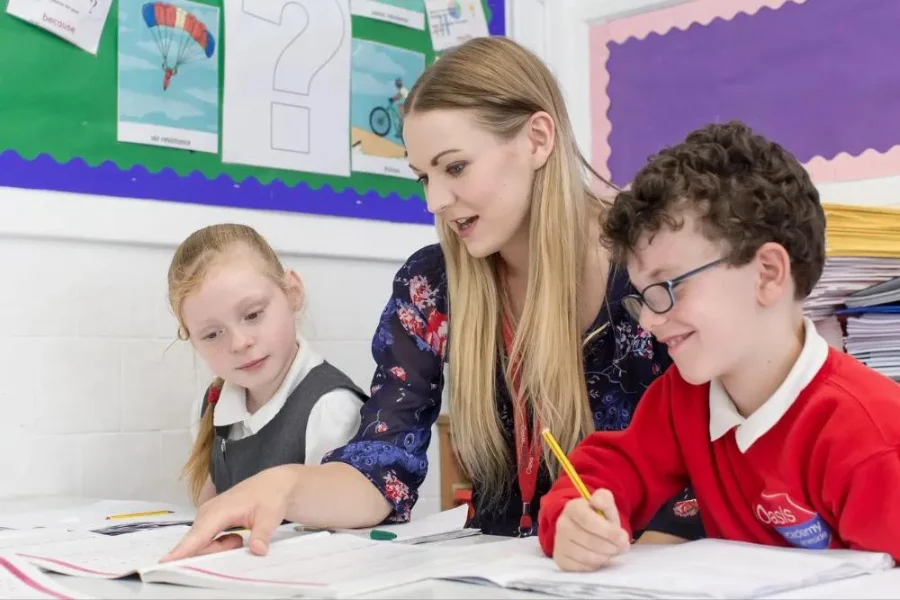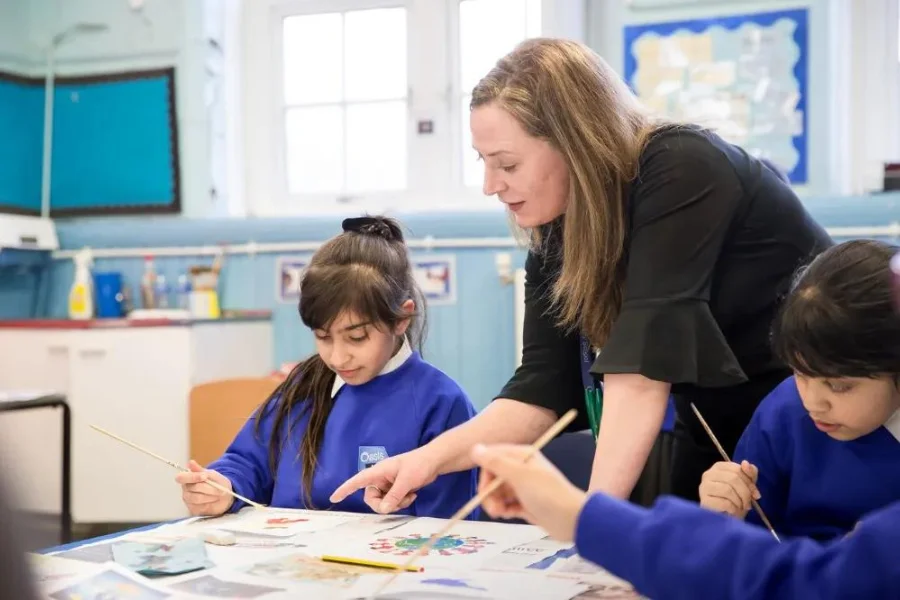Teaching Methods for Pre Primary

Source: oasisacademy
Teaching Methods for Pre Primary
Teaching methods for pre-primary education are a deciding aspect in the process of holistic development of the child. They are building blocks for a solid foundation for happy lifetime learning in young kids. These approaches are not just about communicating information, but also about creating interest and passion in our little beginners. As we discover numerous training approaches for pre-primary, it’s important to assess how each method fosters the developing needs of children in this age group.
From communicating play to storytelling, teaching methods for pre-primary are designed to improve cognitive, social, and emotional growth. This blog objectives to shed light on actual approaches and performs in teaching systems for pre-primary, guaranteeing a joyful and inspiring educational journey for our youngest learners.
Table of Content

Source: myclarks
Montessori Method
- Description: Developed by Maria Montessori, this technique highlights independent, self-directed knowledge. It encourages kids to choose their learning actions from a variety of learning experiences offered by the educator.
- Example: A classroom might have diverse places for reading, math, and science, where kids decide what they want to learn each day.
- Benefits: Promotes independence, decision-making skills, and a love for learning.
Reggio Emilia Approach
- Description: This method opinions young children as capable, resilient, and rich with wonder and knowledge. It inspires exploration, expression, and discovery in a helpful and inspirational atmosphere.
- Example: Students might board on a project-based exploration, such as studying the life cycle of butterflies, guided by their interests.
- Advantages: Enhances creativity, association, and crucial thinking.
To get details of PPTTC Course, Call / Whatsapp on +919869546913 / +919869866277, for more details.
To download the PPTTC Course brochure, Click Here!
Play-Based Learning
- Description: This method stimulates the natural tendency of children to learn through play. It involves using games and play activities to teach important concepts and skills.
- Example: Using blocks to teach basic math concepts or role-playing to develop social skills.
- Benefits: Fosters cognitive and social development in an enjoyable manner.
High Scope Approach
- Description: High Scope focuses on active participatory learning. Children connect with their atmosphere and materials in a hands-on manner, making varieties about their learning experiences.
- Example: Kids planning their day and making choices about what and how they want to study, under educator guidance.
- Advantage: Improves self-esteem, cognitive skills, and social-emotional development.
Waldorf Education
- Description: Waldorf education goals to grow a child’s intellectual, artistic, and practical skills in a combined and holistic manner, concentrating on imagination and creativity.
- Example: Storytelling, arts, and crafts are used to teach various subjects.
- Benefits: Inspires creative thinking and holistic development.

Source: content
Bank Street Approach
- Description: This method is highly child-centered and highlights learning through multiple viewpoints, both in the classroom and in the real world.
- Example: Field trips and community projects to supplement classroom learning.
- Benefits: Builds critical thinking and real-world application skills.
Project-Based Learning
- Description: This technique includes teaching strategies that deliver hands-on learning opportunities. These projects are typically cross-curricular and allow for in-depth search of a subject.
- Example: Creating a small garden to learn about plants, insects, and the environment.
- Benefits: Improves problem-solving aids and understanding of complex ideas.
Multiple Intelligences Theory
- Description: Based on Howard Gardner’s theory, this method classifies that kid have various kinds of intellects, such as linguistic, logical-mathematical, bodily-kinaesthetic, and many more.
- Example: Offering diverse actions that cater to diverse intelligences, like word games, puzzles, or dance.
- Benefits: Supports varied learning styles and holistic development.
Steiner Education
- Description: Similar to Waldorf education, Steiner highlights holistic growth but with a strong importance on ethical and ecological accepting.
- Example: Joining farming, gardening, and nature studies into the curriculum.
- Benefits: Fosters an assembly with environment and ethical mindfulness.
Thematic Learning
- Description: This method involves creating a curriculum around a specific theme, making learning more engaging and relevant.
- Example: A month-long theme on oceans, covering everything from marine biology to sea-inspired art.
- Benefits: Makes learning more cohesive and contextual.
Teaching approaches for pre-primary are not one-size-fits-all; they have to be custom-made to the diverse wants and skills of young learners. By accepting a various variety of plans, educators can create an energetic, appealing, and nurturing learning atmosphere that lays a strong basis for lifetime knowledge.
To get details of PPTTC Course, Call / Whatsapp on +919869546913 / +919869866277, for more details.
To download the PPTTC Course brochure, Click Here!

Source: fresnostate
Montessori Teacher Training Course
The setting of early childhood education is incessantly developing, with the Montessori Method standing out as a beacon of invention and effectiveness. Among the numerous institutions offering training in this admired educational method, Vidhyanidhi Education Society (VES) has established itself as a pioneering unit. Their Montessori Teacher Training Course is exactly planned to equip teachers with the essential services and knowledge to excel in teaching approaches for pre-primary education.
Key Features of VES’s Montessori Teacher Training Course:
Entirely Online Format
In today’s digital era, accessibility to education is vital. VES understands this and offers the entire Montessori Teacher Training Course online. This approach enables aspiring educators from any location to enroll and gain valuable skills in teaching methods for pre-primary children without the constraints of geographical barriers.
Pre-recorded Lectures with Detailed Explanations
Each module of the course is complemented by pre-recorded lectures. These sessions provide a word-to-word explanation of the content, ensuring that trainees receive a thorough understanding of various teaching methods for pre-primary education. This comprehensive approach aids in building a solid foundation for aspiring Montessori educators.
No Examinations, Assignment-based Evaluation
Moving away from traditional examination systems, VES adopts an innovative assignment-based evaluation method. This strategy aligns well with the Montessori philosophy, emphasizing practical knowledge and application of teaching methods for pre-primary education over rote learning.
Designated Course Coordinator for Personalized Guidance
VES assigns a designated course coordinator to each trainee. This personalized guidance ensures that each participant receives individual attention, helping them to grasp and apply the teaching methods for pre-primary education more effectively.
Certification without Mention of Online/Distance Mode
A unique aspect of VES’s Montessori Teacher Training Course is that the certification provided upon completion does not mention the ‘Online’ or ‘Distance’ mode of study. This feature adds value to the certificate, making it as credible as any regular in-person training program certificate.
Vidhyanidhi Education Society’s (Govt. regd.) Montessori Teacher Training Course opinions as an excellent opportunity for those ambitious to master teaching approaches for pre-primary teaching. With its current approach and promise to quality, VES is not just training teachers; it’s shaping the future of education.
Teaching Methods for Pre Primary
Join Vidhyanidhi’s PPTTC Course, shape young minds with innovative pre-primary methods!
To get details of PPTTC Course, Call / Whatsapp on +919869546913 / +919869866277.
To download the PPTTC Course brochure, Click Here!
FAQs
What Qualification Required for Montessori Teachers?
To be a Montessori teacher, a 12th-grade pass from any stream and an MTTC course from VES are needed.
How long is the Training for Montessori Teacher?
Montessori teacher training normally extents from 6 to 12 months, subject upon the course and the institution.
What is the Salary of Montessori Teacher in India?
In India, a Montessori educator’s salary ranges from ₹15,000 to ₹30,000 per month, varying by experience and location.




